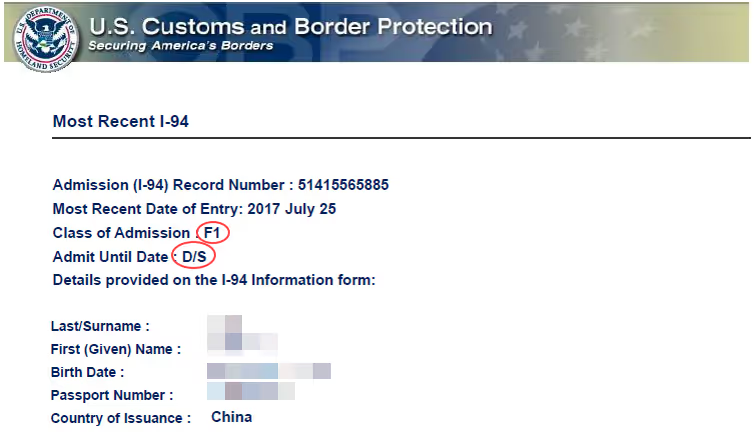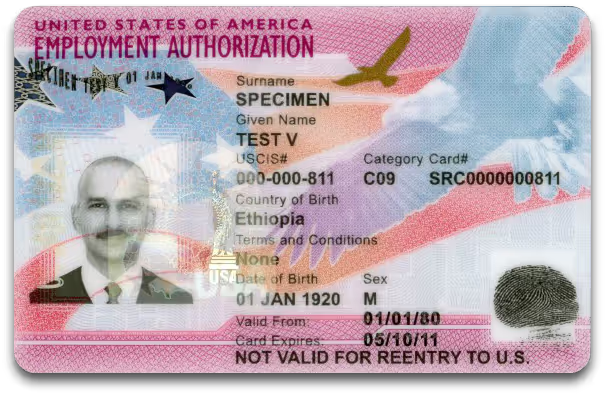Immigration Term Dictionary
Introduction:
Immigration terms can be hard to wrap your head around – especially when you are just starting your immigration journey. To assist you with this, we have compiled some of the most commonly used USCIS terms and their definitions. For a more extensive list of Immigration terms and their definitions, please refer to the USCIS Glossary.
Terms:
A
A-Number/Alien Registration Number/Alien Number (A-Number or A#)
An A-number is an unique seven-, eight- or nine-digit number assigned to a noncitizen by the Department of Homeland Security, used for identification purposes. Also see USCIS Number.
Most people aren’t granted an A-number until they file for a green card, so if you don’t have one yet, don’t worry. However, one exception to this is that students on F-1 visas who are granted work authorization are likely to be assigned an A-number on their EAD card, when issued.
Once you apply for a green card, your A#-number should be listed on all of the documents sent to you by USCIS, including the I-797 notices.
Pro Tip: USCIS will sometimes assign out multiple A#s to an applicant during the immigration process. Be sure to record all A-numbers in a safe place.
Adjustment of Status
Adjustment of Status is the process that you can use to apply for lawful permanent resident status (also known as applying for a Green Card) when you are present in the United States. This means that you may get a Green Card without having to return to your home country to complete visa processing. (Please note that this is different from a Change of Status).
Typically, one would need to submit Form I-485 in order to file to adjust their status.
For more information on Adjustment of Status, please see the following resources:
- What is Adjustment of Status
- Form I-485 Step-by-Step Instructions
- Maintaining H-1B Visa vs Using Adjustment of Status Work and Travel Permit
- What Evidence Must you Provide with Form I-485?
Affidavit
An affidavit is a document in which a person gives facts, and swears that the facts are true and accurate.
For an example of a type of affidavit, see the following article.
Arrival-Departure Record (Form I-94/I-94A)
The Arrival and Departure Record is the I-94, in either paper or electronic format, issued by a Customs and Border Protection (CBP) officer to foreign visitors entering the United States. As of April 30, 2013, most Arrival and/or Departure records are created electronically upon arrival.
For more information, see the following USCIS webpage.
To look up your more recent Form I-94 and/or Travel Record, see the following webpage.
B
Beneficiary
A Beneficiary is an individual who is sponsored by a relative or a business, or has self-petitioned for an immigration benefit. They can also be referred to as the applicant or the intending immigrant.
For example, if a US citizen spouse is hoping to sponsor their spouse for a green card, the spouse needing a green card would be the beneficiary.
C
CBP
An abbreviation for U.S. Customs and Border Protection, an agency of the Department of Homeland Security that is responsible for securing the homeland by preventing the illegal entry of people and goods while facilitating legitimate travel and trade.
Certificate of Citizenship
This is an identity document proving U.S. citizenship. Certificates of Citizenship are issued to derivative citizens and those who acquired U.S. citizenship..
Certificate of Naturalization
A certificate given at the oath ceremony. It serves as evidence of your citizenship.
Civil Surgeon
A Civil Surgeon is a medically trained and licensed physician having no less than 4 years’ experience who is designated by USCIS to perform immigration medical exams in a state where the physician is licensed and practicing medicine.
Civil surgeons practice within the United States. If you are completing your medical exam outside of the United State, you would go through what is called a Panel Physician. Information about Panel Physicians and which ones can be used is provided by the Consulate/Embassy processing the application.
IMPORTANT: Medical examinations will not be recognized if they are given by a doctor in the U.S. who is not a civil surgeon. Please make sure that your appointment is with a civil surgeon, or your results and documents will be invalid.
For more information on the medical exam within the United States, see the following article.
Find a Civil Surgeon near you here.
Conditional resident
Any alien granted permanent resident status on a conditional basis (for example, a spouse of a U.S. citizen or an immigrant investor) who must petition to remove the conditions of their status before the second anniversary of the approval date of their conditional status.
See the following articles to learn more about Removing Conditions from a Conditional Permanent Resident card.
- 5 Tips for Removing Conditions After a Divorce
- What happens after submitting your I-751 – Petition to Remove Conditions?
- Form I-751 & How to Prove Your Marriage is Legitimate
D
Duration of Status (D/S)
Duration of Status (D/S) is a notation on certain nonimmigrant Forms I-94 indicating that a person, such as an F-1 nonimmigrant student, is authorized to remain in the United States as long as they maintain a valid status. In other words, for the duration of their status.


E
Employment Authorization Document (Form I-766/EAD)
A general term used to describe a card USCIS issues on Form I-766, Employment Authorization Card, to aliens who are authorized to work in the United States. The card contains a photograph of the individual and sometimes his or her fingerprint. An alien who has an EAD usually has open-market employment authorization, but there are exceptions.

To learn more about EAD’s, see the following articles:
- Form I-765 EAD Step by Step Guide
- What is an EAD or OPT?
- Submitting an Expedite Request for the Employment Authorization Document (EAD)
F
F-1 Nonimmigrant Student
A person who has been admitted to the United States as a full-time academic student at an accredited college, university, seminary, conservatory, academic high school, elementary school or other academic institution, or in a language training program. The student must be enrolled in a program or course of study that culminates in a degree, diploma or certificate, and the school must be authorized by the U.S. government to accept international students.
To learn more about F1 Visas, see the following Articles:
- F1 Student Visa
- How Do I Apply For an F1 Visa?
- Can I change my F1 status to another non-immigrant status?
- What documents do I need in order to apply for an F1 visa?
- How long can I stay in the U.S. on an F1 visa?
- Can I work while in the United States on an F1 Visa?
- What are my employment options as an F1 Visa holder?
- Can I travel abroad while I am in the United States on F1 status?
Field office
Field offices are offices within a USCIS district that provide services and enforcement functions for a particular portion of the district.
Please note that applicants are assigned a specific field office depending on their physical address. USCIS does not allow for people to request specific field offices.
Use this link to find the field office nearest to you.
G
Green Card
A green card is also known as a Permanent Resident Card, Form I-551, or alien registration card. USCIS issues Green Cards to aliens as evidence of their lawful permanent resident status in the United States. For Form I-9, it is acceptable as proof of identity and employment authorization. Although some Green Cards do not have an expiration date, most are valid for 10 years. Cards issued to individuals with conditional permanent resident status are valid for two years.
To find out if you are eligible to apply for a Green Card, you can use our Eligibility Quiz Here.
I
Immediate Relative
USCIS offers specific protections or exemptions for the immediate relatives of US Citizens. Immediate relatives refer to the nature of the relationship between the petitioner and the beneficiary and includes the following relationship types:
- The spouses of U.S. citizens,
- The children (unmarried and under 21 years of age) of U.S. citizens,
- The parents of U.S. citizens at least 21 years old, and
- Widows or widowers of U.S. citizens if the U.S. citizen filed a petition before his or her death or if the widow(er) files a petition within 2 years of the citizen’s death.
Any other relationship type would not be considered to be an immediate relation. Examples of these other relationships include, but are not limited to, the following examples:
- The aunts or uncles of U.S. Citizens
- The Cousins of U.S. Citizens
- The siblings of U.S. Citizens
L
Last name
Family name or surname.
Lawful Permanent Resident (LPR)
Any person not a citizen of the United States who is living in the U.S. under legally recognized and lawfully recorded permanent residence as an immigrant. Also known as “permanent resident alien,” “resident alien permit holder,” and “Green Card holder.”
M
Maiden name
A woman’s last name or family name at birth, before she married.
Mailing Address
The address where you would like to receive written correspondence from USCIS.
N
Naturalization
Naturalization is the manner in which a person not born in the United States voluntarily becomes a U.S. citizen.
To learn more about Naturalization and the N-400, see the following articles:
- How to Become a United States Citizen
- Applying for U.S. Citizenship: 10 Most Common Questions
- What Happens After Submitting Your Form N-400?
- 4 Common Reasons Citizenship Applications are Denied
- How to Apply for Citizenship while Serving in the United States Military
- What is “Good Moral Character?”
To find out if you are eligible to apply for Citizenship, use our Eligibility Quiz here.
P
Permanent resident
See Lawful Permanent Resident.
Permanent Resident Card (Form I-551)
Also known as a Green Card or alien registration card, this card is issued by USCIS to aliens as evidence of their lawful permanent resident status in the United States. For Form I-9, it is acceptable as proof of identity and employment authorization. Although some Permanent Resident Cards contain no expiration date, most are valid for 10 years. Cards held by individuals with conditional permanent resident status are valid for two years.
Petitioner
A petitioner is a person who files an immigration petition or application on behalf of the beneficiary/intending immigrant.
For example, if a US citizen spouse is trying to get their spouse a green card, the US citizen spouse would be the petitioner and their spouse would be the beneficiary.
Processing Times
Processing times are an estimate of how long it will take to process your case from start to finish. Each case is different, so some cases may take longer than others to process. These processing times tend to be form- and location-specific. You can find our average processing times on the USCIS website. If you use your receipt number to check your case status, please remember that USCIS will only research your case if it is beyond their current processing times.
To look up the current processing times for your assigned field office, go to the following webpage.
R
Re-entry Permit
Permanent or conditional residents should apply for a re-entry permit if they will be outside the United States for one year or more. A valid re-entry permit allows you to apply for admission to the U.S. without having to get a returning resident visa from a U.S. Embassy or Consulate.
Receipt Number
The receipt number is a unique 13-character identifier that USCIS provides for each application or petition it receives. The agency uses it to identify and track its cases.
The receipt number consists of three letters-for example, EAC, WAC, LIN, SRC, NBC, MSC or IOE-and 10 numbers. You can find it on I-797 notices of action (also known as receipt notices) USCIS has sent you via the mail or digitally to your USCIS account.
Request for Evidence (RFE)
USCIS may send you a request for additional evidence if:
- You did not submit all the required evidence;
- The evidence you submitted is no longer valid; or
- The officer needs more information to determine your eligibility.
This request is placed by sending the applicant or petitioner a letter detailing what is being requested and when it needs to be submitted by.
S
Service centers
Service centers only adjudicate applications that individuals have mailed, filed electronically, or filed with a USCIS Lockbox. Service centers do not provide in-person services, conduct interviews, or receive walk-in applications or questions. USCIS has five service centers: California, Nebraska, Potomac, Texas, and Vermont.
Sponsor
In the immigration field, the term “sponsor” often means to bring to the United States or “petition for.”
Another meaning of the term “sponsor” is a person who completes Form I-864, Affidavit of Support Under Section 213A of the Act. However, this type of sponsorship is not the first step in any immigration process.
U
U.S. Citizenship and Immigration Services (USCIS)
USCIS is a federal agency in the Department of Homeland Security that oversees lawful immigration to the United States. Its functions include:
- Granting employment authorization to eligible aliens;
- Issuing documentation of alien employment authorization;
- Maintaining Forms I-9; and
- Administering the E-Verify employment eligibility verification program.
USCIS Number
A USCIS Number is a unique, 9-digit number assigned to a noncitizen by the Department of Homeland Security that is listed on the front of Permanent Resident Cards (Form I-551) issued after May 10, 2010. See also Alien Number.
USCIS Online Account Number
Your USCIS Online Account Number (OAN) is a unique identification number issued by the USCIS online filing system account. You should have one account number for all cases submitted.
Related
General Immigration Information
Articles
Begin Your Immigration Journey Today with SimpleCitizen!
Why spend more time and money on countless legal headaches, when you could just use SimpleCitizen and focus on what matters most – being with those you love! Find new opportunities, start new adventures, and bring your family together with SimpleCitizen today!

